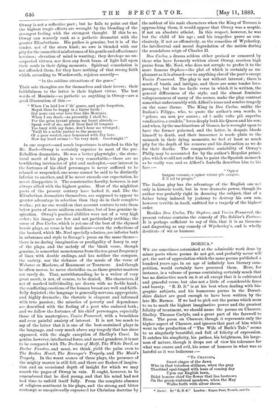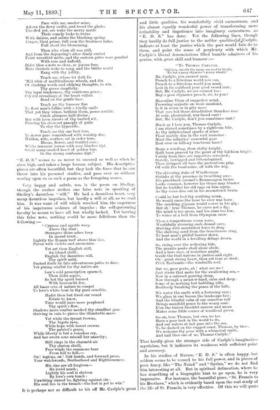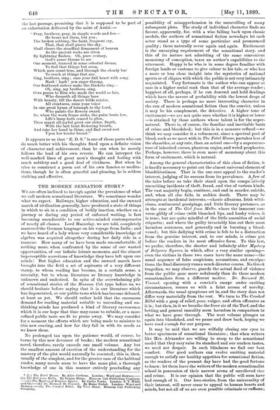DORICA.*
WE are sometimes astonished at the admirable work done by minor poets whose poems do not get, and probably never will get, the sort of appreciation which the same poems published a
hundred years ago, in an age of infinitely less literary com- petition, would certainly have procured them. Here, for instance, is a volume of poems containing certainly much that has no distinctive mark on it at all except that it is cultivated and graceful verse, but also not a little of considerable force and beauty. "E. D. S." is at his best when dealing with bio- graphic subjects, and his humorous poems in the Dorset- shire dialect are good enough to have been written by the late Mr. Barnes. If we had to pick out the poems which seem to us to mark the highest imaginative power and the greatest felicity of treatment, we should name the poems on Chaucer, Shelley, Thomas Carlyle, and a great part of the farewell to Eton. The poem on Chaucer, though it represents only the higher aspect of Chaucer, and ignores that part of him which went to the production of "The Wife of Bath's Tale," seems to us singularly beautiful, and full of felicity of expression. It catches his simplicity, his pathos, his brightness, his large- ness of nature, though it drops out of view his tolerance for what was coarse and evil, his sense of humour in what was as hateful as it was ludicrous :—
"To CneucEn;
Sweet singer of the dawn Who in that voiceless stillness, when the gray Throbbed opal-tinged with hues of coming day Upon our English lawn, Didst honour chief the flower that lies bestrewn On the green-vestured meadows, when the May Walks forth with silver shoon.
• Dorica. By "B, D. S." London Kagan Paul, Trona, and Co.
Pace with me, master mine, Adown the dewy crofts, and tread the glades Unrifled yet, ere wake the merry maids Their comely locks to twine With daisies, and salute the blushing spring. Linger, blest prime, full soon the freshness fades, Full short the blossoming.
Thou who when all was still, And from the dayspring's altar dimly curled Faint wreathed mists, and the eastern gates were pearled With rose and daffodil, Didst blow a note so clear, so joyous free, Mute thickets woke to song, and the blithe world Rang with thy jollity.
Teach me, whose lot doth lie 'Mid whir of multitudinous wheels, and din Of clashing words and eddying thoughts, to win Thy grave simplicity, Thy loyal tenderness, thy courteous grace ; Crystal revealings of the heart within Read on the gentle face.
Teach me thy humour fine To flout men's follies with a kindly smile That yet they wince, bethink them, pause awhile, Catch glimpses half-divine ; But with keen arrows of thy barbed wit, Piercing his close-set panoply of guile To slay the hypocrite.
Teach me thy one best lore, To dower pure womanhood with worship due, Maiden, wife, mother, set in order true,
Bloom, flower, and fruitful core ; White innocent leaves with rosy blushes tipt, Great many-seeded heart of golden hue,
In the strong sunbeams dipt."
E. D. S." seems to us never to succeed so well as when he aims high, and takes a large human subject. His descriptive pieces are often beautiful, but they lack the force that he can throw into his personal studies, and pass over us without scoring upon us as such a poem as the foregoing scores.
Very happy and subtle, too, is the poem on Shelley. though the author strikes one false note in speaking of Shelley's dauntless "will." He had a dauntless heart, very many dauntless impulses, but hardly a will at all, as we read him. It was want of will which wrecked him, the eagerness of his impetuous ardours of impulse the self-governing faculty he seems to have all but wholly lacked. Yet barring this false note, nothing could be more felicitous than the
" Cypress and myrtle weep
Above thy dust ; Strangers thine ashes keep In sacred trust ; Lightly the Roman turf above thee lies, Paven with violets and anemonies.
Yet art thou English still, An island child ; English thy dauntless will, Thy spirit mild, Pushed forth by fate adventurous paths to dare, Yet pining wistful for thy native air.
Law's cold prescription spurned, Thou didst aspire, So hot thy spirit burned With heaven-lit fire, All baser ores of nature to compel To love's white heat in thy pure crucible.
Hadst thou but lived our vexed Estate to know, Time would have more perplexed Thy spirit's flow, Shadows more sombre mocked thy steadfast gaze Striving in vain to pierce the illimitable maze.
Yet while the tyrant frowns, The bigots rave, While hope with laurel crowns The patriot's grave, While liberty is but a voiceless cry, And her sworn sons miscall her anarchy; Still rings in the charmed air Thy clarion shrill, Free winds the summons bear From hill to hill ;— On ! legions, on ! link hands, and forward press, Your watchwords, Brotherhood and Righteousness.
His sins are all forgiven—
He loved much ; Lightly his soul is shriven By love's own touch : Unwitting sinned he, fighting against sin : His soul lies in the breach—the fort is yet to win."
It is perhaps not so difficult to hit off Mr. Carlyle's great
and little qualities, his wonderfully vivid earnestness, and his almost equally wonderful power of transforming mere irritability and impatience into imaginary earnestness, as "E. D. S." has done. Yet the following lines, though they hardly do full justice to the nobler qualities1of;Carlyle, indicate at least the justice which the poet would fain do to them, and point the sense of perplexity with which Mr. Carlyle's liberal denunciations filled humble admirers of his genius, with great skill and humour :—
"To THOMAS CARLYLE.
'Old lion, smooth thy mane: no need to bristle, 'Tis but a puny rhymster's penny whistle.' Mr. Carlyle, you earnest man,
Preach to a frivolous world you can, Preach to a frivolous world you must, Lest in its scabbard your good sword rust ; But, Mr. Carlyle, we are earnest too : May a poor rhymster preach, sir, to you?
Masculine Titan of ruggedest mind, Frowning majestic on weak mankind, Is it in scorn or in pity more That you bid those dreadfullest thunders roar At sour, pharisaical, wry-faced cant ?
But, Mr. Carlyle, don't you sometimes rant ?
Much as I love you, Thomas Carlyle, I am stirred sometimes by a righteous bile, As thy infinitesimal sparks of sense Float mistily dim in the vast immense : Must the infinities' sorrowful gaze Rest ever on billowy tenebrous haze ?
Many a windbag, thou shifty knight, Hath been pierced by the point of thy falchion bright, Vainly from thee are impostors screened ; Stately, bewiged and bebombazined, Thou strippest'all bare the pretentious prig, Off with the bombazine, off with the wig.
The shivering duke of Windlestraw Shrinks at thy presence in trembling awe : His pinchbeck coronet's Brummagem lustre Looks common, however his Grace may bluster. But he huddles his old rags on him again, As thy voice dies out in his moonstruck brain.
Could he but feel thy scathing scorn, He would curse the hour he ever was born : The smirking gigman would cower in his gig ; But ah ! true Thomas, he cares not a fig ; His mind is too gross, and his aims too low, To wince at a bolt from Olympian snow.
Thou a tempestuous ocean wave, Wrathfully storming each dismal cave, Striving with manfullest force to drag The shelving sand from the treacherous crag. To beat man's pitiful barrier down, And the world in a levelling deluge drown.
So, rising over the weltering tide, The granite peaks shall alone abide, And a hero race, of resistless might, Guide the frail nations in justice and right. Oh! great strong heart, thou art true as steel; Prick Rozinante—the windmills reel.
But we, poor poets, ah ! what are wo ?
Just rivers that make for the swallowing sea,— Now in a cataract pouring steep, Now through a meadow-land, calm and deep : Some of us nothing but babbling rills, Restlessly breaking the peace of the hills.
We water the earth with a fostering care ; We glass in our bosom the landscape fair ; And the blissful calm of our ceaseless roll Brings manifold peace to the weary soul: E'en the tiniest brooklet narrow and mean Makes some little corner of woodland green.
Go on, true Thomas, but own we too Have a poor task in the world to do, And our waters at last pass into the sea, To be dashed on the rugged coast, Thomas, by thee ;
We welcome thy prose with a whimsical smile, And hail thee one of us, Thomas Carlyle."
That hardly gives the stronger side of Carlyle's imaginative mysticism, but it indicates its weakness with sufficient point and accuracy.
In his studies of Nature, "E. D. S." is often happy, but seldom seems to be roused to his full power, and in pieces of pure fancy, like "The Naiad" and "Syrinx," we do not find him interesting at all. But in spiritual delineation, where he has something of a biographic hint to go upon, he is very impressive. For instance, the beautiful piece, "St. Francis to his Brothers," which is evidently based upon the real study of the life of St. Francis, is very effective. Of this we will quote the last passage, premising that it is supposed to be part of an exhortation delivered by the saint of Assisi :— " Pray, brothers, pray, in simple words and few—
He hears not them, but you ; The broken sobbing, the faint, frequent cry, That, that shall pierce the sky, Shall cleave the steadfast firmament of heaven As the ancient rocks are riven By lightning flashes. Oh, pure ecstasy, God's azure throne to see One moment, tranced in some celestial dream, To feel that things but seem, Which men count true, and through the cloudy bar To reach at things that are. Sing, brothers, sing ; ease your full heart with song.
Hark' hark ! yon eager throng,
Our feathered sisters make the thickets ring—
Oh, sing, my brothers, sing.
Give praise to Him who made the world so fair, Who dresseth all things bare With beauty, till the desert wilds rejoice.
All creatures, raise your voice In one great hymn of triumph to the Lord, Who paints the flowery sward. So, when the worn frame sinks, the pulse beats low, Life's lamp hath ceased to glow, Thou mayst all-joyful greet our sister, Death, With the last faint flickering breath, And take her hand in thine, and find sweet rest Upon her tender breast."
It appears to us that "E. D. S." is one of those poets who can -do much better with his thoughts fixed upon a definite vision of character and achievement, than he can when he merely follows the lead of his own reverie. He can interpret the well-marked lines of great men's thought and feeling with much subtlety and a good deal of vividness. But when he tries to construct a poem out of his own fancies or medita- tions, though he is often graceful and pleasing, he is seldom striking and effective.








































 Previous page
Previous page